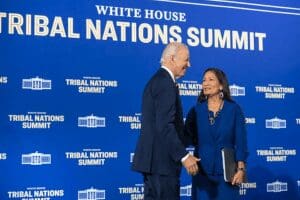$20 billion allocated to Indian Country under American Rescue Plan
The largest single investment in tribal governments and communities in U.S. history affects more than 2.6 million people.

The Treasury Department on Wednesday released a report detailing the impact that the 2021 American Rescue Plan has had on Indian Country, noting that the $20 billion delivered was the “largest single infusion” of federal funds into tribal governments, communities, and businesses in U.S. history.
In a statement issued by the Treasury Department to announce the report, Marilynn Malerba, the treasurer of the United States and the lifetime chief of the Mohegan Tribe, said: “Today’s report shows that State and Local Fiscal Recovery Funds are having direct, deep, and meaningful economic impacts on Tribal nations’ pandemic recovery. By investing in Tribal economies, we are fostering economic prosperity for our nation at large.”
Malerba was appointed treasurer in June by President Joe Biden and is the first Native American to serve in the position.
The funds sent to Indian Country were part of the Coronavirus State and Local Fiscal Recovery Funds program that was created after the $1.9 trillion American Rescue Plan passed Congress and was signed into law by Biden. The law was passed with only Democratic votes in the House and the Senate, with a tie-breaking vote in the Senate cast by Vice President Kamala Harris.
The new report notes that the $20 billion allocation has been distributed to 579 tribes and impacted more than 2.6 million members of those tribes. More than 3,000 project proposals submitted by tribal governments were approved by the Treasury Department.
Funded projects include expanding the availability of health care on tribal lands by recruiting more health care workers and increasing vaccination sites and health campaigns. Native American communities have historically faced significant health care disparities as a result of systemic racism and discrimination.
Federal funds are also being used to subsidize pay for employees of tribal governments and foster care for families living on tribal lands; build infrastructure to deliver water, electricity, and broadband service; and provide assistance to small businesses and nonprofits affected by the COVID-19 pandemic.
The report was released during the 2022 session of the White House Tribal Nations Summit, an event started under former President Barack Obama but not convened under former President Donald Trump.
Biden spoke at the summit on Wednesday, highlighting his administration’s efforts in Indian Country to improve health care, criminal justice and public safety and to protect sites considered sacred to various tribes.
The administration on Wednesday announced a $135 million commitment to assist in relocating tribal communities that have been affected by climate change: Eleven tribes will receive federal funding through the Department of the Interior and the Federal Emergency Management Administration.
Published with permission of The American Independent Foundation.
Recommended

Biden calls for expanded child tax credit, taxes on wealthy in $7.2 trillion budget plan
President Joe Biden released his budget request for the upcoming fiscal year Monday, calling on Congress to stick to the spending agreement brokered last year and to revamp tax laws so that the “wealthy pay their fair share.”
By Jennifer Shutt, States Newsroom - March 11, 2024
December jobs report: Wages up, hiring steady as job market ends year strong
Friday’s jobs data showed a strong, resilient U.S. labor market with wages outpacing inflation — welcome news for Americans hoping to have more purchasing power in 2024.
By Casey Quinlan - January 05, 2024
Biden’s infrastructure law is boosting Nevada’s economy. Sam Brown opposed it.
The Nevada Republican U.S. Senate hopeful also spoke out against a rail project projected to create thousands of union jobs
By Jesse Valentine - November 15, 2023









































































